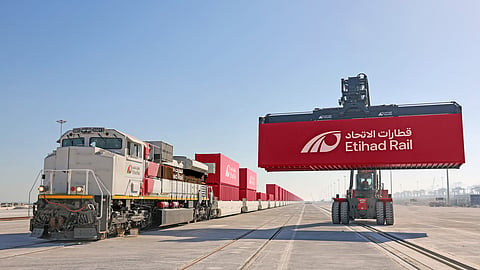Etihad Rail: Powering Trade and Economic Integration Across the GCC
The Gulf Cooperation Council (GCC) region is undergoing a major infrastructure transformation, and at the center of it is Etihad Rail - the United Arab Emirates’ ambitious national rail network.
While headlines often highlight passenger services, the real economic weight of the project lies in freight: connecting industries, ports, and borders in ways that will redefine regional trade. With the GCC Railway vision on the horizon, Etihad Rail is set to become a backbone for commerce across the Arabian Peninsula.
Building a Freight Superhighway
Etihad Rail’s freight network, completed in 2023, stretches nearly 900 km from the Saudi border at Ghuweifat to the eastern port of Fujairah. Along the way, it links critical trade hubs: Jebel Ali Port, Khalifa Port, and ICAD industrial zone in Abu Dhabi. This layout isn’t incidental, it was engineered to knit together the UAE’s ports, logistics centers, and industrial complexes into a seamless corridor.
By replacing long-haul truck transport with rail freight, the project delivers a range of benefits:
Lower costs: Rail can move high-volume goods more cheaply over long distances, reducing logistics expenses for companies.
Time savings: Predictable schedules mean less waiting at congested roads and borders.
Safety and sustainability: Moving goods by rail reduces road accidents and cuts carbon emissions by an estimated 70–80% per tonne-kilometer.
Etihad Rail Announces Game-Changing High-Speed Train Link Between Abu Dhabi and Dubai
Already, trains are carrying key commodities such as sulfur, construction materials, and petrochemicals, with capacity designed to scale toward containers, bulk cargo, and even perishable goods.
Unlocking Port Competitiveness
The UAE’s ports are among the busiest in the world, competing to serve Asia–Europe trade flows and Gulf transshipment. By linking ports directly to inland production zones and regional borders, Etihad Rail enhances their competitiveness.
For example, manufacturers in Abu Dhabi’s Khalifa Industrial Zone can load goods directly onto rail wagons, which then travel to Jebel Ali for global shipping or eastward to Fujairah, bypassing the congested Strait of Hormuz. This multimodal integration means goods can reach markets faster and at lower cost.
In another development this week, Etihad Rail, Abu Dhabi Customs, Fujairah Customs, AD Ports Group, Fujairah Terminals, and Noatum Logistics have all agreed to launch a new “Bonded Rail Corridor”, linking Khalifa Port in Abu Dhabi with Fujairah Terminals.
Rail also creates redundancy: if one port faces congestion or disruption, cargo can be rerouted via other UAE gateways without relying solely on trucks. That resilience is a major advantage in today’s volatile supply chain environment.
Strengthening GCC Trade Corridors
Beyond national benefits, Etihad Rail is positioned as the UAE’s contribution to the GCC Railway, a proposed 2,177-km network linking all six Gulf states. The economic case is strong: the GCC is a US$2 trillion bloc, with trade flows heavily dependent on highways and sea lanes. Rail would diversify logistics channels, reduce bottlenecks, and speed up intra-GCC movement.
One of the most advanced cross-border initiatives is the Hafeet Rail project, a joint venture between Etihad Rail and Oman Rail. It will connect the UAE’s Al Ain to Oman’s Sohar Port, providing a direct land bridge between Emirati industries and Oman’s Indian Ocean gateway. This link can shorten shipping times for GCC exports headed eastward and make the Gulf less reliant on narrow maritime chokepoints.
Further down the line, a rail corridor to Saudi Arabia, already linked at Ghuweifat, could enable Abu Dhabi–Riyadh freight in under 10 hours, transforming the efficiency of bilateral trade.
Catalyzing Industry and Investment
Trade benefits of Etihad Rail go beyond moving goods. The network catalyzes industrial clustering, attracting manufacturers who want proximity to rail corridors for cheaper distribution. Logistics parks, warehousing, and free zones located near rail stations are expected to multiply, creating an ecosystem that supports both SMEs and large exporters.
In parallel, the project draws foreign investment. International logistics companies and shipping giants are exploring partnerships to leverage rail as a core part of their Gulf operations.
Financially, Etihad Rail has aligned with sustainable finance frameworks, signaling that future expansion - including green cargo wagons and low-emission technologies - will also appeal to ESG-conscious investors.
Trade Risks and Opportunities
To realize its full trade potential, Etihad Rail must navigate several challenges such as:
Cross-border harmonization: Customs clearance, cargo standards, and scheduling must align with neighboring GCC states to ensure smooth transit.
Volume aggregation: Rail thrives on scale; sustained demand from heavy industries and container trade is crucial.
Last-mile logistics: For exporters and importers, connections to warehouses and distribution hubs are as important as the mainline.
But the opportunities outweigh the hurdles. By reducing trucking dependence, rail enhances road capacity for local distribution while taking pressure off Gulf highways.
By enabling just-in-time supply chains, it supports diversification into non-oil industries. And by expanding eastward through Oman and westward into Saudi Arabia, it embeds the UAE into the arteries of regional commerce.
The Bigger Picture: GCC Economic Integration
Etihad Rail is more than a domestic infrastructure project - it is a catalyst for Gulf-wide integration. If the GCC Railway vision is realized, rail could unlock tens of billions of dollars in annual trade efficiency gains, while cutting regional transport emissions and positioning the Gulf as a model for sustainable logistics.
For the UAE, it cements a role as the central connector of east–west flows across the Gulf. For the GCC, it’s a path toward resilience, diversification, and stronger internal trade ties.
In the decades ahead, as freight trains continue to roll across the desert, Etihad Rail will be remembered not just as a railway, but as a trade artery that helped bind the Gulf economies closer together.
Read More: AD Ports Group Launches New Rail Logistics Offering via Etihad Rail Network


